辅音浊化
辅音浊化的条件(二)

辅音浊化的条件(二)辅音浊化的条件什么是辅音浊化辅音浊化是一种音变现象,在语言学中指的是辅音发音时由清音变为浊音的过程。
简单来说,声带在发音过程中振动所产生的声音,被称为浊音;声带不振动所产生的声音,则为清音。
辅音浊化的条件辅音浊化不是任何时候都会发生,它需要满足一定的条件。
以下是导致辅音浊化的几个常见条件:1.词尾辅音:辅音浊化通常在词的结尾发生。
例如,在英语单词”red”中,末尾的/d/音即为辅音浊化。
这种现象在许多语言中都非常普遍,比如法语和西班牙语。
2.连读和借位:当辅音前后相邻的音素发生变化时,辅音浊化往往会出现。
例如,在英语中,相邻的单词之间常常发生辅音浊化。
比如,“an apple”中的/n/音在与后面的辅音/t/相邻时浊化为/d/。
3.弱化:辅音谐音的现象也是导致辅音浊化的一种条件。
当辅音在连续发音时受到其他音素的影响,它可能会变得更加浊化。
例如,英语中的/t/音在连续发音中容易变得比较浊。
4.方言变体:辅音浊化在不同的方言和口音中呈现出不同的特点。
一些方言中的辅音浊化现象更为明显。
例如,在中国的一些地方方言中,/p/、/t/和/k/三个辅音会浊化为/b/、/d/和/g/。
综上所述,辅音浊化的发生需要结合词尾辅音、连读和借位、弱化以及方言变体等条件。
这些条件的不同组合和影响会导致不同的辅音浊化现象出现。
了解这些条件对于准确理解和学习各种语言的发音规则非常重要。
参考资料:•Crystal, D. (1985). A Dictionary of Linguistics and Phonetics. Wiley-Blackwell.•Ladefoged, P. (2006). A Course in Phonetics. Cengage Learning.。
浊化发音规则范文

浊化发音规则范文浊化是指在一些特定的语音环境下,清辅音发音会发生变化,变成相应的浊辅音的现象。
浊化发音规则是各个语言中的语音规律之一、下面我将从国际音标的角度,详细介绍英语中的浊化发音规则。
1.阻塞音浊化:阻塞音指的是:/p,t,k/。
在英语中,当它们出现在重读音节的词首,且紧跟着元音的情况下,它们会浊化为相应的浊塞音,即/b,d,g/。
例如:- paper [ˈpeɪpər] --> /p/浊化为/b/- water [ˈwɔːtər] --> /t/浊化为/d/- idea [aɪˈdiːə] --> /k/浊化为/g/2.辅音浊化:辅音指的是:/f, th, s, ʃ, tʃ/. 在英语中,当它们出现在重读音节的词尾,而下一个词是以元音开头的情况下,它们会浊化为相应的浊辅音,即/v, ð, z, ʒ, dʒ/。
例如:- those oranges [ðəʊz ˈɒrɪndʒɪz] --> /s/浊化为/z/- six hours [sɪks ˈaʊərz] --> /s/浊化为/z/- much easier [mʌtʃˈiːzɪər] --> /tʃ/浊化为/dʒ/3.末尾辅音浊化:在英语中,有一些辅音在词尾是浊辅音,但在词尾后面连续出现的情况下,会由于语音运动的便利性而浊化。
例如:- dogs [dɒɡz] --> 由于/d/后面的/s/需要舌尖抵住齿龈,所以/s/会浊化变为/z/- cats [kæts] --> 与上例相同,/t/后面的/s/会浊化变为/z/- boxes [ˈbɒksɪz] --> /ks/的/s/会浊化变为/z/需要注意的是,浊化并不是所有时候都发生。
它受到语音环境的限制,只在特定的情况下才会出现。
浊化发音规则在语音交际中起到了很重要的作用,它有助于提高语言的流畅度和自然度。
同时,它也是语音学研究的重要内容之一、对于学习者来说,了解浊化的规则可以帮助他们更好地理解和掌握英语发音,并在口语交流中更加准确地表达自己的意思。
浊化现象
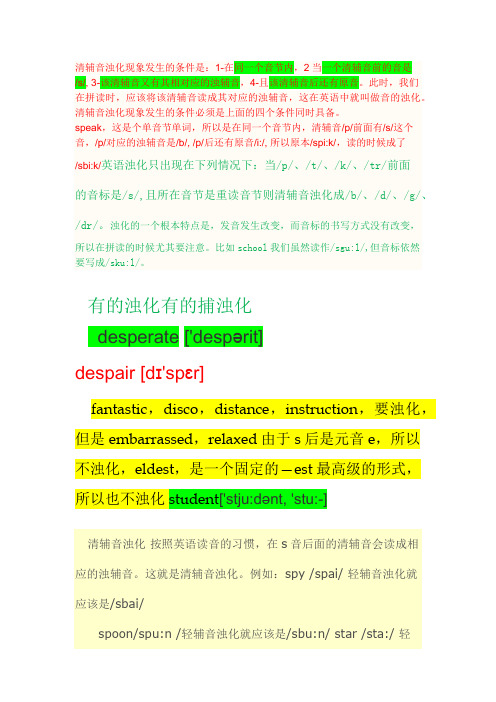
清辅音浊化现象发生的条件是:1-在同一个音节内,2当一个清辅音前的音是/s/, 3-该清辅音又有其相对应的浊辅音,4-且该清辅音后还有原音。
此时,我们在拼读时,应该将该清辅音读成其对应的浊辅音,这在英语中就叫做音的浊化。
清辅音浊化现象发生的条件必须是上面的四个条件同时具备。
speak,这是个单音节单词,所以是在同一个音节内,清辅音/p/前面有/s/这个音,/p/对应的浊辅音是/b/, /p/后还有原音/i:/, 所以原本/spi:k/,读的时候成了/sbi:k/英语浊化只出现在下列情况下:当/p/、/t/、/k/、/tr/前面的音标是/s/,且所在音节是重读音节则清辅音浊化成/b/、/d/、/g/、/dr/。
浊化的一个根本特点是,发音发生改变,而音标的书写方式没有改变,所以在拼读的时候尤其要注意。
比如school我们虽然读作/sgu:l/,但音标依然要写成/sku:l/。
有的浊化有的捕浊化desperate ['despərit]despair [dɪ'spɛr]fantastic,disco,distance,instruction,要浊化,但是embarrassed,relaxed由于s后是元音e,所以不浊化,eldest,是一个固定的—est最高级的形式,所以也不浊化student['stju:dənt, 'stu:-]清辅音浊化按照英语读音的习惯,在s音后面的清辅音会读成相应的浊辅音。
这就是清辅音浊化。
例如:spy /spai/ 轻辅音浊化就应该是/sbai/spoon/spu:n /轻辅音浊化就应该是/sbu:n/ star /sta:/ 轻辅音浊化就应该是 /sda:/这是英语发音的一个不成文规则-清辅音的浊化。
当一些清辅音如[t] [k] [p] [tr]等出现在[s]音后且该音节是重读音节时,这些清辅音要浊化成相对的浊辅音,即[d] [g] [dr]。
清辅音浊化定义
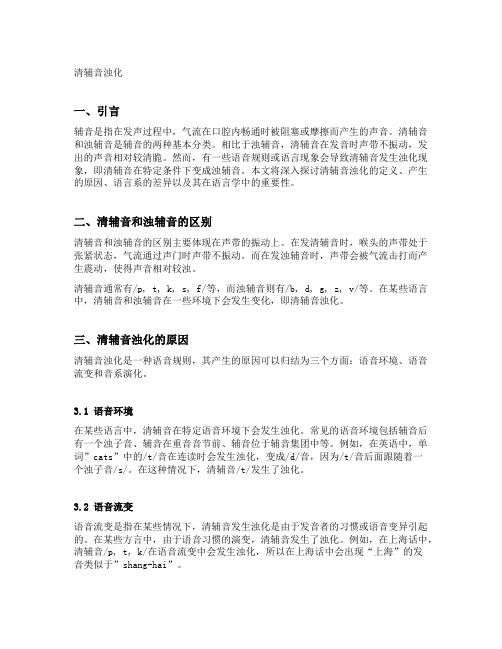
清辅音浊化一、引言辅音是指在发声过程中,气流在口腔内畅通时被阻塞或摩擦而产生的声音。
清辅音和浊辅音是辅音的两种基本分类。
相比于浊辅音,清辅音在发音时声带不振动,发出的声音相对较清脆。
然而,有一些语音规则或语言现象会导致清辅音发生浊化现象,即清辅音在特定条件下变成浊辅音。
本文将深入探讨清辅音浊化的定义、产生的原因、语言系的差异以及其在语言学中的重要性。
二、清辅音和浊辅音的区别清辅音和浊辅音的区别主要体现在声带的振动上。
在发清辅音时,喉头的声带处于张紧状态,气流通过声门时声带不振动。
而在发浊辅音时,声带会被气流击打而产生震动,使得声音相对较浊。
清辅音通常有/p, t, k, s, f/等,而浊辅音则有/b, d, g, z, v/等。
在某些语言中,清辅音和浊辅音在一些环境下会发生变化,即清辅音浊化。
三、清辅音浊化的原因清辅音浊化是一种语音规则,其产生的原因可以归结为三个方面:语音环境、语音流变和音系演化。
3.1 语音环境在某些语言中,清辅音在特定语音环境下会发生浊化。
常见的语音环境包括辅音后有一个浊子音、辅音在重音音节前、辅音位于辅音集团中等。
例如,在英语中,单词”cats”中的/t/音在连读时会发生浊化,变成/d/音,因为/t/音后面跟随着一个浊子音/s/。
在这种情况下,清辅音/t/发生了浊化。
3.2 语音流变语音流变是指在某些情况下,清辅音发生浊化是由于发音者的习惯或语音变异引起的。
在某些方言中,由于语音习惯的演变,清辅音发生了浊化。
例如,在上海话中,清辅音/p, t, k/在语音流变中会发生浊化,所以在上海话中会出现“上海”的发音类似于”shang-hai”。
3.3 音系演化音系演化是指随着时间的推移,清辅音发生了浊化。
语言随着时间的推移会发生变化,这也会影响到发音规则。
例如,在历史演化的过程中,英语中的清辅音/t/发生了浊化,变为现代英语中的/d/。
这种音系演化使得清辅音浊化成为了今天英语的一种发音规则。
英语变音规则
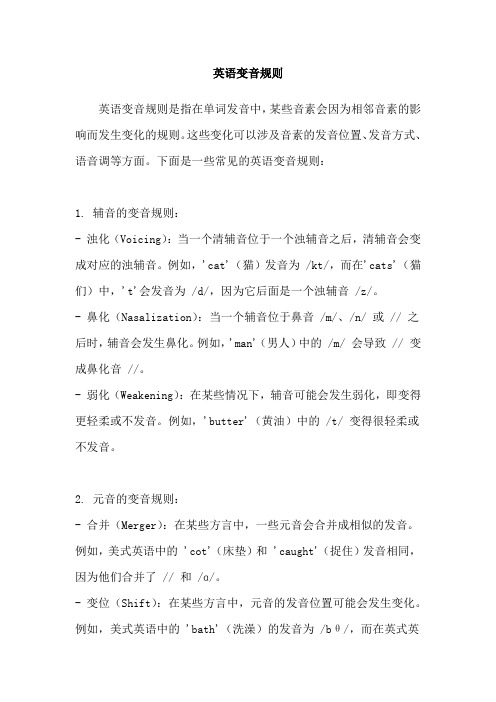
英语变音规则英语变音规则是指在单词发音中,某些音素会因为相邻音素的影响而发生变化的规则。
这些变化可以涉及音素的发音位置、发音方式、语音调等方面。
下面是一些常见的英语变音规则:1. 辅音的变音规则:- 浊化(Voicing):当一个清辅音位于一个浊辅音之后,清辅音会变成对应的浊辅音。
例如,'cat'(猫)发音为 /kt/,而在'cats'(猫们)中,'t'会发音为 /d/,因为它后面是一个浊辅音 /z/。
- 鼻化(Nasalization):当一个辅音位于鼻音 /m/、/n/ 或 // 之后时,辅音会发生鼻化。
例如,'man'(男人)中的 /m/ 会导致 // 变成鼻化音 //。
- 弱化(Weakening):在某些情况下,辅音可能会发生弱化,即变得更轻柔或不发音。
例如,'butter'(黄油)中的 /t/ 变得很轻柔或不发音。
2. 元音的变音规则:- 合并(Merger):在某些方言中,一些元音会合并成相似的发音。
例如,美式英语中的 'cot'(床垫)和 'caught'(捉住)发音相同,因为他们合并了 // 和 /ɑ/。
- 变位(Shift):在某些方言中,元音的发音位置可能会发生变化。
例如,美式英语中的 'bath'(洗澡)的发音为 /bθ/,而在英式英语中则为 /bɑθ/。
- 弱化(Weakening):在某些情况下,元音可能会发生弱化,即发音变得更短暂或不发音。
例如,'butter'(黄油)中的 // 变得更短暂。
- 升调(Raising):在某些条件下,元音的语音调可能会上升。
例如,美式英语中的 'pin'(别针)的发音为 /pn/,而在一些方言中,它的发音可能为 /pn/,语音调上升。
这些变音规则在英语中非常常见,不仅会影响单词的发音,也会对口语交流中的流利度产生影响。
英语中辅音浊化规则
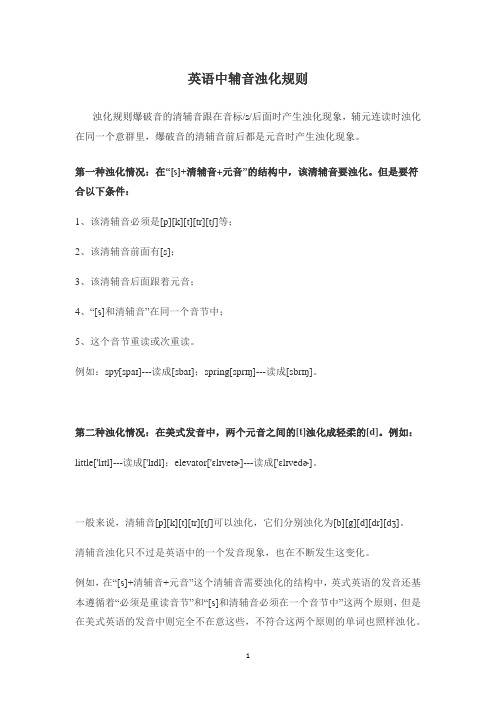
英语中辅音浊化规则
浊化规则爆破音的清辅音跟在音标/s/后面时产生浊化现象,辅元连读时浊化在同一个意群里,爆破音的清辅音前后都是元音时产生浊化现象。
第一种浊化情况:在“[s]+清辅音+元音”的结构中,该清辅音要浊化。
但是要符合以下条件:
1、该清辅音必须是[p][k][t][tr][tʃ]等;
2、该清辅音前面有[s];
3、该清辅音后面跟着元音;
4、“[s]和清辅音”在同一个音节中;
5、这个音节重读或次重读。
例如:spy[spaɪ]---读成[sbaɪ];spring[sprɪŋ]---读成[sbrɪŋ]。
第二种浊化情况:在美式发音中,两个元音之间的[t]浊化成轻柔的[d]。
例如:little['lɪtl]---读成['lɪdl];elevator['ɛlɪvetɚ]---读成['ɛlɪvedɚ]。
一般来说,清辅音[p][k][t][tr][tʃ]可以浊化,它们分别浊化为[b][g][d][dr][dʒ]。
清辅音浊化只不过是英语中的一个发音现象,也在不断发生这变化。
例如,在“[s]+清辅音+元音”这个清辅音需要浊化的结构中,英式英语的发音还基本遵循着“必须是重读音节”和“[s]和清辅音必须在一个音节中”这两个原则,但是在美式英语的发音中则完全不在意这些,不符合这两个原则的单词也照样浊化。
而且随着人们发音的变化,现在基本都把[s]和后面需要浊化的清辅音写到一个音节中了。
清辅音浊化
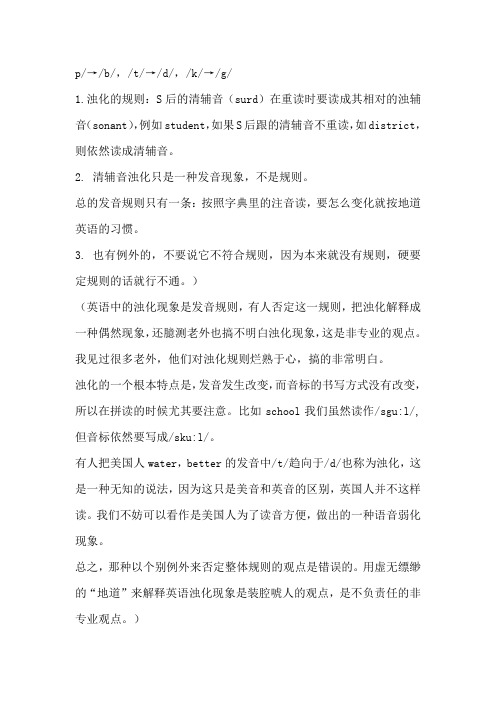
p/→/b/,/t/→/d/,/k/→/g/1.浊化的规则:S后的清辅音(surd)在重读时要读成其相对的浊辅音(sonant),例如student,如果S后跟的清辅音不重读,如district,则依然读成清辅音。
2. 清辅音浊化只是一种发音现象,不是规则。
总的发音规则只有一条:按照字典里的注音读,要怎么变化就按地道英语的习惯。
3. 也有例外的,不要说它不符合规则,因为本来就没有规则,硬要定规则的话就行不通。
)(英语中的浊化现象是发音规则,有人否定这一规则,把浊化解释成一种偶然现象,还臆测老外也搞不明白浊化现象,这是非专业的观点。
我见过很多老外,他们对浊化规则烂熟于心,搞的非常明白。
浊化的一个根本特点是,发音发生改变,而音标的书写方式没有改变,所以在拼读的时候尤其要注意。
比如school我们虽然读作/sgu:l/,但音标依然要写成/sku:l/。
有人把美国人water,better的发音中/t/趋向于/d/也称为浊化,这是一种无知的说法,因为这只是美音和英音的区别,英国人并不这样读。
我们不妨可以看作是美国人为了读音方便,做出的一种语音弱化现象。
总之,那种以个别例外来否定整体规则的观点是错误的。
用虚无缥缈的“地道”来解释英语浊化现象是装腔唬人的观点,是不负责任的非专业观点。
)(清辅音浊化按照英语读音的习惯,在s音后面的清辅音会读成相应的浊辅音。
这就是清辅音浊化。
例如:spy /spai/ 轻辅音浊化就应该是/sbai/spoon/spu:n /轻辅音浊化就应该是/sbu:n/ star /sta:/ 轻辅音浊化就应该是 /sda:/这是英语发音的一个不成文规则-清辅音的浊化。
当一些清辅音如等出现在音后且该音节是重读音节时,这些清辅音要浊化成相对的浊辅音,即。
如street, 在发音时应当发成[ s dr i: t ],其它的如stay, school, space, scream, stand, strike, speak, sky, spring 等等。
辅音浊化
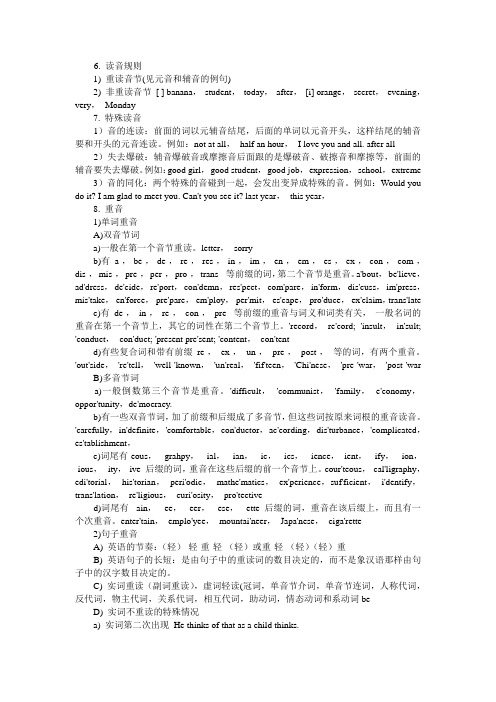
6. 读音规则1) 重读音节(见元音和辅音的例句)2) 非重读音节[ ] banana,student,today,after,[i] orange,secret,evening,very,Monday7. 特殊读音1)音的连读:前面的词以元辅音结尾,后面的单词以元音开头,这样结尾的辅音要和开头的元音连读。
例如:not at all,half an hour,I love you and all. after all 2)失去爆破:辅音爆破音或摩擦音后面跟的是爆破音、破擦音和摩擦等,前面的辅音要失去爆破。
例如:good girl,good student,good job,expression,school,extreme 3)音的同化:两个特殊的音碰到一起,会发出变异成特殊的音。
例如:Would you do it? I am glad to meet you. Can't you see it? last year,this year,8. 重音1)单词重音A)双音节词a)一般在第一个音节重读。
letter,sorryb)有a-,be-,de-,re-,res-,in-,im-,en-,em-,es-,ex-,con-,com-,dis-,mis-,pre-,per-,pro-,trans- 等前缀的词,第二个音节是重音。
a'bout,be'lieve,ad'dress,de'cide,re'port,con'demn,res'pect,com'pare,in'form,dis'cuss,im'press,mis'take,en'force,pre'pare,em'ploy,per'mit,es'cape,pro'duce,ex'claim,trans'latec)有de-,in-,re-,con-,pre- 等前缀的重音与词义和词类有关,一般名词的重音在第一个音节上,其它的词性在第二个音节上。
英语发音规则浊化连读弱化爆破
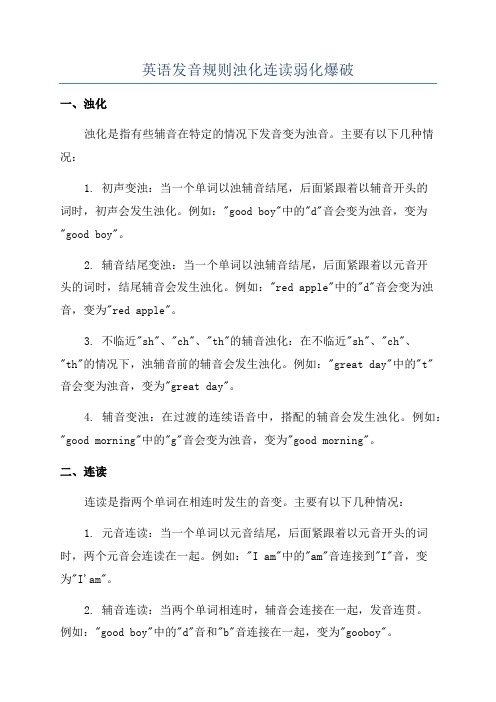
英语发音规则浊化连读弱化爆破一、浊化浊化是指有些辅音在特定的情况下发音变为浊音。
主要有以下几种情况:1. 初声变浊:当一个单词以浊辅音结尾,后面紧跟着以辅音开头的词时,初声会发生浊化。
例如:"good boy"中的"d"音会变为浊音,变为"good boy"。
2. 辅音结尾变浊:当一个单词以浊辅音结尾,后面紧跟着以元音开头的词时,结尾辅音会发生浊化。
例如:"red apple"中的"d"音会变为浊音,变为"red apple"。
3. 不临近"sh"、"ch"、"th"的辅音浊化:在不临近"sh"、"ch"、"th"的情况下,浊辅音前的辅音会发生浊化。
例如:"great day"中的"t"音会变为浊音,变为"great day"。
4. 辅音变浊:在过渡的连续语音中,搭配的辅音会发生浊化。
例如:"good morning"中的"g"音会变为浊音,变为"good morning"。
二、连读连读是指两个单词在相连时发生的音变。
主要有以下几种情况:1. 元音连读:当一个单词以元音结尾,后面紧跟着以元音开头的词时,两个元音会连读在一起。
例如:"I am"中的"am"音连接到"I"音,变为"I'am"。
2. 辅音连读:当两个单词相连时,辅音会连接在一起,发音连贯。
例如:"good boy"中的"d"音和"b"音连接在一起,变为"gooboy"。
英语中的浊化现象
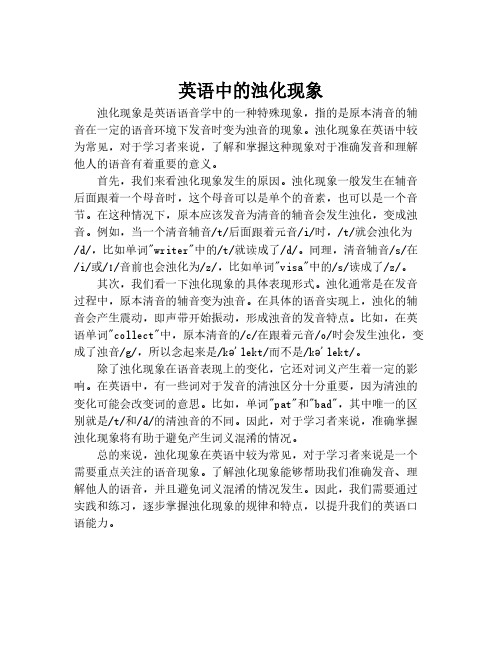
英语中的浊化现象浊化现象是英语语音学中的一种特殊现象,指的是原本清音的辅音在一定的语音环境下发音时变为浊音的现象。
浊化现象在英语中较为常见,对于学习者来说,了解和掌握这种现象对于准确发音和理解他人的语音有着重要的意义。
首先,我们来看浊化现象发生的原因。
浊化现象一般发生在辅音后面跟着一个母音时,这个母音可以是单个的音素,也可以是一个音节。
在这种情况下,原本应该发音为清音的辅音会发生浊化,变成浊音。
例如,当一个清音辅音/t/后面跟着元音/i/时,/t/就会浊化为/d/,比如单词"writer"中的/t/就读成了/d/。
同理,清音辅音/s/在/i/或/ɪ/音前也会浊化为/z/,比如单词"visa"中的/s/读成了/z/。
其次,我们看一下浊化现象的具体表现形式。
浊化通常是在发音过程中,原本清音的辅音变为浊音。
在具体的语音实现上,浊化的辅音会产生震动,即声带开始振动,形成浊音的发音特点。
比如,在英语单词"collect"中,原本清音的/c/在跟着元音/o/时会发生浊化,变成了浊音/g/,所以念起来是/kə'lekt/而不是/kə'lekt/。
除了浊化现象在语音表现上的变化,它还对词义产生着一定的影响。
在英语中,有一些词对于发音的清浊区分十分重要,因为清浊的变化可能会改变词的意思。
比如,单词"pat"和"bad",其中唯一的区别就是/t/和/d/的清浊音的不同。
因此,对于学习者来说,准确掌握浊化现象将有助于避免产生词义混淆的情况。
总的来说,浊化现象在英语中较为常见,对于学习者来说是一个需要重点关注的语音现象。
了解浊化现象能够帮助我们准确发音、理解他人的语音,并且避免词义混淆的情况发生。
因此,我们需要通过实践和练习,逐步掌握浊化现象的规律和特点,以提升我们的英语口语能力。
英语清辅音浊化现象

英语清辅音浊化现象
1、清辅音浊化条件
(1) 清辅音/p/、/t/、/k/、/tr/紧接在/S/后。
(2) 清辅音/p/、/t/、/k/、/tr/后紧接元音。
(3) 清辅音/p/、/t/、/k/、/tr/和/s/在同一音节,且该音节为重读或次重读音节。
(4) 结构:同一重读或次重读音节中,/s/+/p/、/t/、/k/、/tr/+元音,读音浊化为/s/+/b/、/d/、/g/、/dr/+元音,书写不变。
2、清辅音浊化举例
(1) /p/浊化为/b/:speak[spiːk]
(2) /t/浊化为/d/:stand[stænd]
(3) /K/浊化为/g/:school[skuːl]
(4) /tr/浊化为/dr/:[striːt]
(5) 不浊化rest [rest] (辅音后无元音),dis/play [dɪ's‐pleɪ]、as/tro/nau/ti/cal[æs‐trə‐'nɔː‐tɪ‐kəl](不在同一音节), spe/ci/fic [spə‐'sɪ‐fɪk]、mon/ster['mɒn‐stə(r)] 、mi/ni/ster ['mɪ‐nɪ‐stə(r)]( 在同一音节,但不是重读或次重读音节)。
3、注意
(1) 英语本身没有浊化的规则,只是英语民族的发音习惯,多听多见多领悟,不要被规则限制。
(2) 地道美音中有些词读的很快,听起来像浊化,但是读法并未浊化,eg:water ['wɔːtə(r)] 。
英语清辅音浊化规则
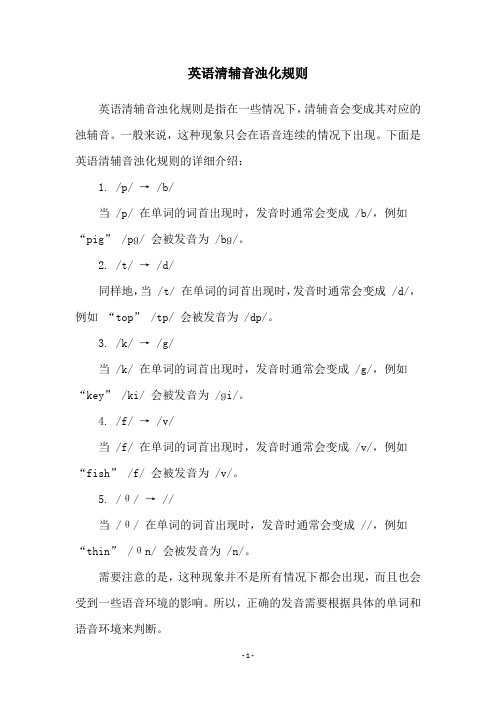
英语清辅音浊化规则
英语清辅音浊化规则是指在一些情况下,清辅音会变成其对应的浊辅音。
一般来说,这种现象只会在语音连续的情况下出现。
下面是英语清辅音浊化规则的详细介绍:
1. /p/ → /b/
当 /p/ 在单词的词首出现时,发音时通常会变成 /b/,例如“pig” /pɡ/ 会被发音为 /bɡ/。
2. /t/ → /d/
同样地,当 /t/ 在单词的词首出现时,发音时通常会变成 /d/,例如“top” /tp/ 会被发音为 /dp/。
3. /k/ → /g/
当 /k/ 在单词的词首出现时,发音时通常会变成 /g/,例如“key” /ki/ 会被发音为 /ɡi/。
4. /f/ → /v/
当 /f/ 在单词的词首出现时,发音时通常会变成 /v/,例如“fish” /f/ 会被发音为 /v/。
5. /θ/ → //
当 /θ/ 在单词的词首出现时,发音时通常会变成 //,例如“thin” /θn/ 会被发音为 /n/。
需要注意的是,这种现象并不是所有情况下都会出现,而且也会受到一些语音环境的影响。
所以,正确的发音需要根据具体的单词和语音环境来判断。
s浊化发音规则范文

s浊化发音规则范文浊化是指在一些语音环境下,原本清音的辅音发音变成浊音的现象。
在汉语中,浊化规则普遍存在,而且是一个较为复杂的问题。
下面将针对汉语中的浊化发音规则进行详细讨论。
1.辅音浊化:1.1.b,d,g的浊化当b,d,g在词尾出现时,会自动浊化为p,t,k。
例如:波/bō/ → 假/jiǎ/ 答/dá/ → 的 /de/ 长/zhǎng/ → 唱/chàng/1.2.j,q,x的浊化当 j, q, x 在一些语音环境下出现时,会浊化为 zh, ch, sh 的发音。
例如:京/jīng/ → 晶/jīng/ 曲/qū/ → 足/zú/ 血 /xue/ → 学/xué/1.3.z,c,s的浊化当 z, c, s 在一些语音环境下出现时,会浊化为 zh, ch, sh 的发音。
例如:自/zì/ → 知/zhī/ 吃/chī/ → 池/chí/ 力/lì/ → 石/shí/1.4. zh, ch, sh 的浊化当 zh, ch, sh 在一些语音环境下出现时,会浊化为 z, c, s 的发音。
例如:知/zhī/ → 自 /zì/ 池/chí/ → 吃/chī/ 石/shí/ → 力/lì/2.韵尾浊化:在一些方言或口语中,汉语的韵尾辅音会发生浊化现象。
具体规则如下:2.1. n, ng 的浊化当 n, ng 出现在韵尾时,会浊化为 l, g。
例如:心/xin/ → 口 /kou/ 牛/niu/ → 你 /ni/2.2. ian, uan, üan 的浊化当ian, uan, üan 出现在韵尾时,会浊化为i, u, ü。
例如:千/qian/ → 钱 /qian/ 对 /dui/ → 对 /dui/2.3. in, ing, ün 的浊化当in, ing, ün 出现在韵尾时,会浊化为i, ng, ü。
辅音浊化的条件

辅音浊化的条件辅音浊化是语音学中的一个重要现象,指的是在一些语言中,辅音在特定的条件下变成浊音的过程。
辅音浊化的条件有多种,下面将逐一介绍。
1. 环境浊化环境浊化是指辅音在特定的环境下发生浊化。
常见的环境浊化条件有:- 元音环境:当辅音前后都是元音时,辅音容易发生浊化。
比如英语中的/t/音在元音前后时会浊化成/d/音,如"better"中的/t/音发音为/d/音。
- 辅音环境:当辅音前后都是浊辅音时,辅音容易发生浊化。
比如英语中的/s/音在浊辅音前后时会浊化成/z/音,如"dogs"中的/s/音发音为/z/音。
2. 语音位置浊化语音位置浊化是指辅音在特定的语音位置上发生浊化。
常见的语音位置浊化条件有:- 词首浊化:某些语言中,词首的辅音容易发生浊化。
比如法语中的/p/音在词首时会浊化成/b/音,如"parler"中的/p/音发音为/b/音。
- 词尾浊化:某些语言中,词尾的辅音容易发生浊化。
比如德语中的/k/音在词尾时会浊化成/g/音,如"T ag"中的/k/音发音为/g/音。
3. 语音重音浊化语音重音浊化是指辅音在重读音节中发生浊化。
常见的语音重音浊化条件有:- 重读音节浊化:某些语言中,辅音在重读音节中容易发生浊化。
比如西班牙语中的/t/音在重读音节中会浊化成/d/音,如"bota"中的/t/音发音为/d/音。
4. 语言联系浊化语言联系浊化是指辅音在不同语言之间发生浊化。
不同语言中对辅音的浊化条件可能存在差异。
比如汉语中的/f/音在接触到英语时容易发生浊化,如"food"中的/f/音发音为/v/音。
辅音浊化是语言中的一种普遍现象,不同语言在辅音浊化的条件上可能存在差异。
辅音浊化的条件与语音环境、语音位置、语音重音以及语言联系等因素密切相关。
对于学习和研究语言的人来说,了解辅音浊化的条件是非常重要的,可以帮助我们正确地发音和理解不同语言中的辅音变化。
清辅音浊化定义

清辅音浊化定义清辅音浊化是一种语音现象,发生在一些语言中的辅音音素上。
在这种现象中,原本清音的辅音在某些情况下会变成浊音。
这种现象广泛存在于世界各地的语言中,包括英语、德语、法语、汉语等。
1. 清辅音和浊辅音的定义在探讨清辅音浊化之前,我们需要先了解清辅音和浊辅音的概念。
清辅音是指发声时喉部不震动的辅助元素,如 /p/、/t/、/k/ 等。
而浊辅音则是指发声时喉部震动的元素,如 /b/、/d/、/g/ 等。
2. 清辅音浊化的定义清辅音浊化指的是,在一些特定情况下,原本应该发出清辅音的词汇或句子中,这些清辅音会被自然地转变为对应的浊辅音。
例如,在英语中,“cat”这个单词中的 /t/ 应该是一个清辅音,但当它出现在“cats” 中时(即/t͡s/),它就会自然地变成一个带有喉部震动(即变成了/d/) 的浊辅音。
3. 清辅音浊化的原因清辅音浊化是一种自然语言现象,其原因可以归结为人类语言习得的规律。
在大多数语言中,人们更倾向于发出浊辅音而不是清辅音。
这是因为浊辅音在发声过程中需要喉部震动,而这种震动可以使得发声更加有力、强调和生动。
因此,在一些情况下,为了让词汇或句子更具表现力,人们会自然地将清辅音转变为浊辅音。
4. 清辅音浊化的影响清辅音浊化对于语言学习者来说可能会带来一定的挑战。
由于不同语言中清辅音和浊辅音的使用规律不同,所以对于母语不同的人来说,理解和掌握清辅音浊化规律可能需要花费一定的时间和精力。
但是,在掌握了这种现象之后,学习者也会更加容易地理解和使用相应的语言,并且能够更好地表达自己。
5. 清辅音浊化在不同语言中的表现虽然清辅音浊化是一个普遍存在于各种语言中的现象,但是不同语言中的表现形式却存在一定的差异。
在英语中,清辅音浊化通常发生在/t/ 和 /p/ 后面跟着元音或半元音的情况下,例如“cat” 变成“cats”。
而在汉语中,清辅音浊化则通常发生在 /k/、/p/、/t/ 后面跟着韵母“i”、“ü”、“u” 的情况下,例如“kuài” 变成“guài”。
浊化
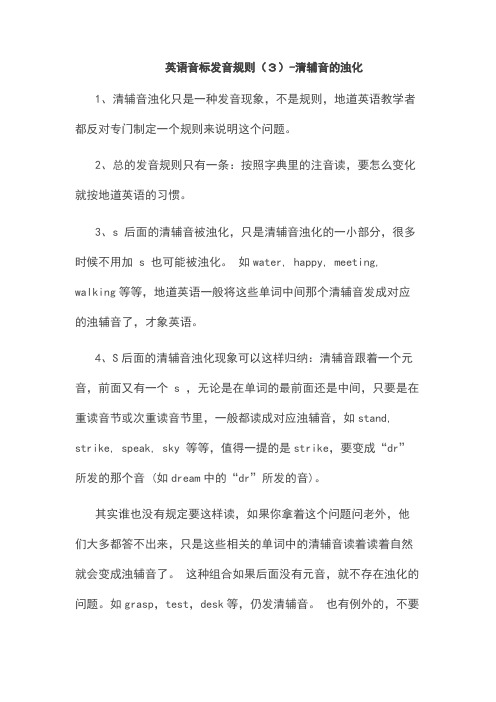
英语音标发音规则(3)-清辅音的浊化1、清辅音浊化只是一种发音现象,不是规则,地道英语教学者都反对专门制定一个规则来说明这个问题。
2、总的发音规则只有一条:按照字典里的注音读,要怎么变化就按地道英语的习惯。
3、s 后面的清辅音被浊化,只是清辅音浊化的一小部分,很多时候不用加 s 也可能被浊化。
如water, happy, meeting, walking等等,地道英语一般将这些单词中间那个清辅音发成对应的浊辅音了,才象英语。
4、S后面的清辅音浊化现象可以这样归纳:清辅音跟着一个元音,前面又有一个 s ,无论是在单词的最前面还是中间,只要是在重读音节或次重读音节里,一般都读成对应浊辅音,如stand, strike, speak, sky 等等,值得一提的是strike,要变成“dr”所发的那个音 (如dream中的“dr”所发的音)。
其实谁也没有规定要这样读,如果你拿着这个问题问老外,他们大多都答不出来,只是这些相关的单词中的清辅音读着读着自然就会变成浊辅音了。
这种组合如果后面没有元音,就不存在浊化的问题。
如grasp,test,desk等,仍发清辅音。
也有例外的,不要说它不符合规则,因为本来就没有规则,硬要定规则的话就行不通。
比如student,stupid,如果按那个所谓规则去读成[sd…],就不好听了,操地道英语的人就会知道问“你是从中国来的吧”。
这里的字母“t”一般被习惯发成jeep中“j”所发的那个音才地道。
首先要明确一个概念:浊音不送气清音是不一样的。
中国人学外语基本上都纠结在这个浊音上了,因为大部分外语都是有浊音的。
而欧州语言区分送气不送气音的并不多。
清音,就是指发音时,声带不颤动。
普通话的b d g, p t k单独发都是清音。
你可以做个实验,看看自已说“卑鄙”这个词时,中间有没有断开。
如果没断开,就说明你口齿不清,说话含乎,建议你找一找播音员的声音听听。
你可以再找老外说的“baby”听听,看他的ba和by中间有没有断开。
英语发音浊化规则
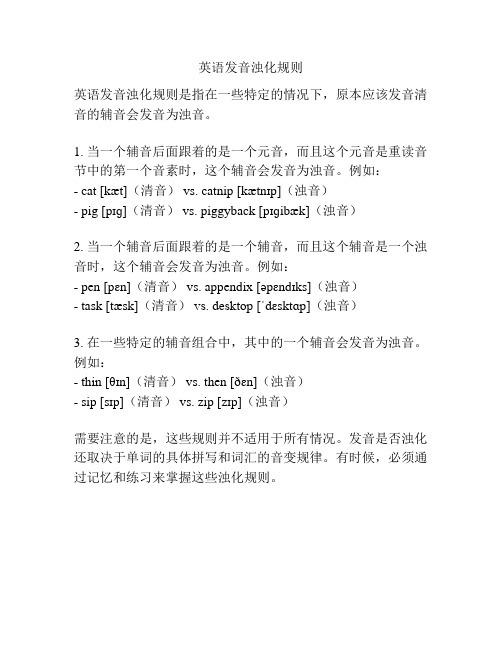
英语发音浊化规则
英语发音浊化规则是指在一些特定的情况下,原本应该发音清音的辅音会发音为浊音。
1. 当一个辅音后面跟着的是一个元音,而且这个元音是重读音节中的第一个音素时,这个辅音会发音为浊音。
例如:
- cat [kæt](清音) vs. catnip [kætnɪp](浊音)
- pig [pɪɡ](清音) vs. piggyback [pɪɡibæk](浊音)
2. 当一个辅音后面跟着的是一个辅音,而且这个辅音是一个浊音时,这个辅音会发音为浊音。
例如:
- pen [pɛn](清音) vs. appendix [əpɛndɪks](浊音)
- task [tæsk](清音)vs. desktop [ˈdɛsktɑp](浊音)
3. 在一些特定的辅音组合中,其中的一个辅音会发音为浊音。
例如:
- thin [θɪn](清音) vs. then [ðɛn](浊音)
- sip [sɪp](清音) vs. zip [zɪp](浊音)
需要注意的是,这些规则并不适用于所有情况。
发音是否浊化还取决于单词的具体拼写和词汇的音变规律。
有时候,必须通过记忆和练习来掌握这些浊化规则。
- 1、下载文档前请自行甄别文档内容的完整性,平台不提供额外的编辑、内容补充、找答案等附加服务。
- 2、"仅部分预览"的文档,不可在线预览部分如存在完整性等问题,可反馈申请退款(可完整预览的文档不适用该条件!)。
- 3、如文档侵犯您的权益,请联系客服反馈,我们会尽快为您处理(人工客服工作时间:9:00-18:30)。
重音1)单词重音A)双音节词a)一般在第一个音节重读。
letter ,sorryb)有a- , be- , de- , re- , res- , in- , im- , en- , em-, es- , ex- , con-, com-,dis- ,mis- ,pre- ,per- ,pro- ,trans- 等前缀的词,第二个音节是重音。
a'bout ,be'lieve ,ad'dress ,de'cide ,re'port ,con'demn ,res'pect ,com'pare ,in'form ,dis'cuss ,im'press ,mis'take ,en'force ,pre'pare ,em'ploy ,per'mit ,es'cape ,pro'duce ,ex'claim ,trans'latec)有de- ,in- ,re- ,con- ,pre- 等前缀的重音与词义和词类有关,一般名词的重音在第一个音节上,其它的词性在第二个音节上。
'record ,re'cord; 'insult ,in'sult;'conduct ,con'duct; 'present pre'sent; 'content ,con'tent d)有些复合词和带有前缀re- ,ex- ,un- ,pre- ,post- ,等的词,有两个重音。
'out'side ,'re'tell ,'well-'known ,'un'real ,'fif'teen ,'Chi'nese ,'pre-'war ,'post-'war B)多音节词a)一般倒数第三个音节是重音。
'difficult ,'communist ,'family ,e'conomy,oppor'tunity ,de'mocracy.b)有一些双音节词,加了前缀和后缀成了多音节,但这些词按原来词根的重音读音。
'carefully ,in'definite ,'comfortable ,con'ductor ,ac'cording ,dis'turbance ,'complicated ,es'tablishment ,c)词尾有-eous ,-grahpy ,-ial ,-ian ,-ic ,-ics ,-ience ,ient ,-ify ,-ion ,-ious ,-ity ,ive 后缀的词,重音在这些后缀的前一个音节上。
cour'teous ,cal'ligraphy ,edi'torial ,his'torian ,peri'odic ,mathe'matics ,ex'perience ,suf'ficient ,i'dentify ,trans'lation ,re'ligious ,curi'osity ,pro'tectived)词尾有-ain ,-ee ,-eer ,-ese ,-ette 后缀的词,重音在该后缀上,而且有一个次重音。
enter'tain ,emplo'yee ,mountai'neer ,Japa'nese ,ciga'rette 2)句子重音A)英语的节奏:(轻)-轻-重-轻- (轻)或重-轻- (轻)(轻)重B)英语句子的长短:是由句子中的重读词的数目决定的,而不是象汉语那样由句子中的汉字数目决定的。
C)实词重读(副词重读),虚词轻读(冠词,单音节介词,单音节连词,人称代词,反代词,物主代词,关系代词,相互代词,助动词,情态动词和系动词beD)实词不重读的特殊情况a)实词第二次出现He thinks of that as a child thinks.b)一个名词被第二个名词修饰I met her in the railway station.c)代替词Which book do you want? The small one.d)感叹词中的what 和how What a good day it is !How beautiful she is !e) street 在专有名词中Wangfujing Street.f) this 在这些短语中,this morni ng/afterno on/eve ningE) 虚词重读的特殊情况a) 情态动词,助动词和系动词be在句首,句尾和否定时。
Do you like it? Yes,I do. Are you a doctor? Yes ,I am. Can you help me? Yes ,I can. I don't like you. He isn't a worker.b) 情态动词表示可能,惊奇和肯定时。
They may come this evening. Can it befive already? He must be in the room.c) 介词在句首和句尾。
In the box ,he found a letter. He is the person I talked with.d) 引导复合句的连词在句首。
If you wish,I'll visit you. Whenhe comes I'll tell him.e) 反身代词表示强调。
He could n't come himself.清辅音浊化一、简单认识?例如:?spy?/spai/?轻辅音浊化就应该是/sbai/?spoon/spu:n?/轻辅音浊化就应该是/sbu:n/?star?/sta:/? 轻辅音浊化就应该是?/sda:/?清辅音在/s/后浊化?如stick?中t读作/d/?辅音浊化也并非完全的发浊音,它是界于清音和浊音之间那儿!发音并不如浊音那么强烈!?二、理性分析?1) ?众所周知,同一音节中,紧接在/s/音后头的/p,t,k/和作为音节开头的/p,t,k/语音特点是不同的。
国内英语教学界历来普遍把这种语音变化称作“浊化”。
2) ?所谓“浊”,无非是与“清”相对。
英语/p,t,k/是清爆破辅音,与浊爆破辅音/b,d,g/相对。
汉语[b,d,g]和[p,t,k]的区别可以说纯粹是送气与不送气的区别。
可英语呢?/p,t,k/是强清爆破辅音,在一般情况下发音都伴随较强的送气过程。
而?/b,d,g/则示弱浊爆破音,除了一般不送气之外,多半还有喉头声带震动,即所谓浊化。
最后这一点,恰恰是汉语所没有的。
例如很多人把?a?guy?发成十足的“厄盖”,甚至还以为两者发音本来就是一样的,这就是因为他们“浊”不了那个该浊的?g。
反过来,经过努力好不容易把英语的?/b,d, g/? “浊”够了,发正确了,一听说/p,t,k/在/s/后面要“浊化”,很多人(包括我们的语音老师)竟会把?sky?/?spade?/?start? 发成?sgy?/?sbade/?sdart ,那就矫枉过正反成谬误了。
其实,/s/后面/p,t,k/ 的主要语音变化,不是“浊化”,而是失去了原来很强的送气特点罢了,其效果,就成了和汉语不送气的?[b,d,g]紧贴在/s/后头一样。
?3) ?是否在音节重读的时候才会出现这种“送气变成不送气”的现象呢?不是的。
可以说,哪怕是最强的重读音节里,女口?spin中,?/p/音都成了不送气的。
在非重读音节里,就更不消说了。
?4)?从英语语音学(而不是英语音位学)角度分析,这些音质变化也可能可以归入“浊化”范围,但这对我们一般学英语的人来说是没有多少实际意义的,因此不属于本帖讨论范围。
?5)?有兴趣的朋友可参考一些权威语音学着作,例如英国Daniel?Jones?和.?Gimso n?的着作等。
?coast中的"t"是否被前面的"s"所浊化为"d"。
?答:不是。
?1、清辅音浊化只是一种发音现象,不是规则,地道英语教学者都反对专门制定一个规则来说明这个问题。
?2、总的发音规则只有一条:按照字典里的注音读,要怎么变化就按地道英语的习惯3、s?后面的清辅音被浊化,只是清辅音浊化的一小部分,很多时候不用加?s?也可能被浊化。
?如water,?happy,?meeting,?walking 等等,地道英语一般将这些单词中间那个清辅音发成对应的浊辅音了,才象英语。
?4、S后面的清辅音浊化现象可以这样归纳:清辅音跟着一个元音,前面又有一个?s?,无论是在单词的最前面还是中间,只要是在重读音节或次重读音节里,一般都读成对应浊辅音,如sta nd,?strike,?speak,?sky? 等等,值得一提的是strike “tr ”要变成“ dr”所发的那个音?(如dream中的“ dr”所发的音)。
?其实谁也没有规定要这样读,如果你拿着这个问题问老外,他们大多都答不出来,只是这些相关的单词中的清辅音读着读着自然就会变成浊辅音了。
’这种组合如果后面没有元音,就不存在浊化的问题。
如grasp,test ,desk等,仍发清辅音。
?也有例外的,不要说它不符合规则,因为本来就没有规则,硬要定规则的话就行不通。
比如student , stupid,如果按那个所谓规则去读成?[sd…], 就不好听了,操地道英语的人就会知道问“你是从中国来的吧”。
这里的字母“t ”一般被习惯发成jeep中?“j ”所发的那个音才地道。
?四、辅音浊化的规则?在探讨美国英语与英国英语在语音上的差异时,我们通常是将“美国普通话”(General?American?,?简称GA与公认的标准英语发音(Received?Pro nun ciatio n,? 简称)进行比较。
二者在读音上的差异主要表现在:?1. ?在/s/?/F/?/f/?/m/?/n/ 等辅音之前的字母a,美国英语一般读作/A/?音,而英国音则发作/a/。
如:美国人将pass?(通过),chanee (机会)分别读作2. ?在英国标准音中,字母r在元音前才发音,如real?(真实的),而在辅音前或词尾时是不发音的。
